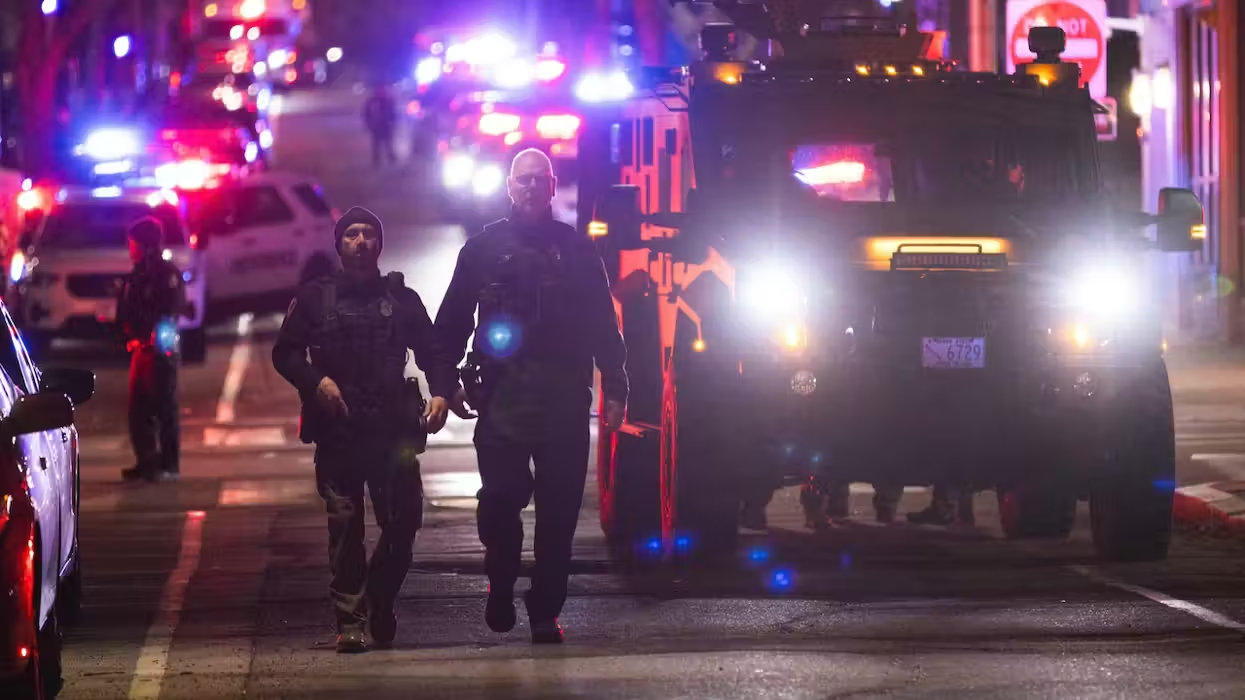NEW YORK (TheBlaze/AP) -- The convicted rapist formerly known as Louis Massei wore pink clam diggers and shoulder-length hair parted on the side for a star turn on the witness stand last week in a Manhattan courtroom.
The transgender witness, who now goes by the name Lisa, was there to describe what it was like to be involuntarily placed in a psychiatric facility for mentally-ill offenders.
"My roommate was a person who fed his girlfriend to homeless people," said Massei, who took part in the gang rape of a 16-year-old girl, to the jury. "You can't run, you can't fight. Someone has decided this is where you belong."
Massei, 52, is among six ex-cons who have sued former Gov. George Pataki and other state officials for tens of millions of dollars. The lawsuit accuses the state of abusing its authority eight years ago by transferring the plaintiffs to psychiatric facilities at the end of their prison terms - in effect, summarily extending their sentences without recourse. None of the plaintiffs are still in mental health institutions.
Two of the other sex offenders in the lawsuit include:
- convicted child molester Kenneth Bailey
- Robert Trocchio, who spent 21 years behind bars for sodomizing a child
 Three undated photos downloaded from the New York Division of Criminal Justice Services Registry of Sex Offenders website show Robert Trocchio, left; Louis (a.k.a. Lisa) Massei; center; Kenneth Bailey, right. The three former New York State prison inmates are suing former New York Gov. George Pataki and other state officials, accusing them of abusing their authority in 2005 by transferring them to psychiatric facilities after they completed their prison terms. (AP Photo/New York Division of Criminal Justice Services)
Three undated photos downloaded from the New York Division of Criminal Justice Services Registry of Sex Offenders website show Robert Trocchio, left; Louis (a.k.a. Lisa) Massei; center; Kenneth Bailey, right. The three former New York State prison inmates are suing former New York Gov. George Pataki and other state officials, accusing them of abusing their authority in 2005 by transferring them to psychiatric facilities after they completed their prison terms. (AP Photo/New York Division of Criminal Justice Services)
Pataki is expected to testify early this week at a civil trial that's a study in society's struggle to protect the public from violent predators while preserving the legal rights of those same offenders. Abbe Lowell, Pataki's lawyer, said in opening statements that Pataki knew in 2005 that 16 other states had addressed the problem of sexually violent predators being released after their prison terms by involuntary civil commitments to psychiatric institutions.
About 20 states now allow certain sex offenders to be detained at psychiatric facilities after their sentences are served if they have a mental disorder that would make them more likely to offend again. For several years, Pataki had tried to get state legislators to address the issue unsuccessfully.
After a newly paroled rapist killed a woman in 2005 in a suburban mall parking lot, Pataki's solution was to use existing laws to direct prison officials to have the worst sex offenders evaluated for involuntary civil commitment once released from prison. The practice was halted in late 2006 after a state court found that the 12 men who were committed should have been entitled to hearings before it happened, but some of the prisoners remained in psychiatric institutions years afterward.
"I represent six convicted sex offenders," plaintiffs' attorney Reza Rezvani said in opening statements this month. "Never for one second will you hear me defend what they've done. What you will hear me defend is the Constitution of the United States of America, that Constitution that gives us the right before our government locks us up ... the right to have a chance to be heard."
Barbara Hathaway, a lawyer for the state, argued that the plaintiffs ended up getting the treatment they needed, calling it "a case of no harm, no foul." Under the program, 800 people were evaluated and 127 were committed, she added.
"This was not a rubber stamp," she said. "Doctors were using their professional judgment."
Massei and the other plaintiffs who have testified so far have sought to convince the jury that they were railroaded. But they've also been confronted on cross-examination with their sordid pasts.
"Was it true you still have deviant thoughts about children from time to time?" a state attorney asked convicted child molester Bailey.
"From time to time," Bailey responded while insisting that he doesn't believe he's mentally ill.
Bailey, 55, testified that as he neared the end of a 10-year prison term, he dreamed of marrying his girlfriend and settling into an ordinary life. He had put a down payment on 10 acres of land and lined up a job as a janitor.
Instead, he wound up in the Manhattan Psychiatric Center, an imposing, fortress-like facility that's a familiar sight to travelers entering Manhattan on the Robert F. Kennedy Bridge. His hopes were dashed when he saw the deplorable conditions inside.
"Many other patients were heavily medicated," he said. "They didn't know where they were or care. Some of them were curled up on the floor in the corner and soiled themselves, drooling over themselves."
"It was scary," he added. "I didn't think I was ever going to be released."
Massei, who served 25 years for his part in the gang rape, described looking forward to escaping the constant scrutiny he felt behind bars.
"I've been told I was different all my life," he said. "I want to be ignored."
Once committed to psychiatric care, he and the other convicted sex offenders were never given any treatment, he said.
"We were separated from the other patients," he said. "We were treated like `the experiment.'"
His comment to jurors that he had lived with a roommate who had fed his girlfriend to homeless people was an apparent reference to a man found innocent by reason of insanity in 1991 in the death of a Swiss dancer who came to New York to study. Authorities said her boyfriend killed her when she asked him to move out, boiled some of her flesh and served it in soup to homeless people in a Manhattan park.
Another witness, Robert Trocchio, spent 21 years behind bars for sodomizing a child before being transferred to the psychiatric center without explanation.
"I didn't deserve to be there," he said. "I shouldn't have been there at all."
Trocchio, 50, testified that he instead deserved freedom because he'd already served the maximum. It was a particularly difficult time because staff and fellow inmates "look down on" sex offenders, he said.
"Sex offender - that's the worst," he said. "You'd be better off having multiple murders."
On cross-examination, he was confronted with records accusing him of acting out against prison employees, but he said he was provoked.
Asked if he ever used a homophobic slur against a staffer, he responded, "I probably called him that and many other things. ... This is a guy calling me a pedophile, a rapist."
He also was asked about an evaluation noting that he planned to smoke marijuana if ever released from a mental institution.
"You mean smoke a big fat blunt? Yes," he answered. "And that's exactly what I did when I got out."
--
[related]








